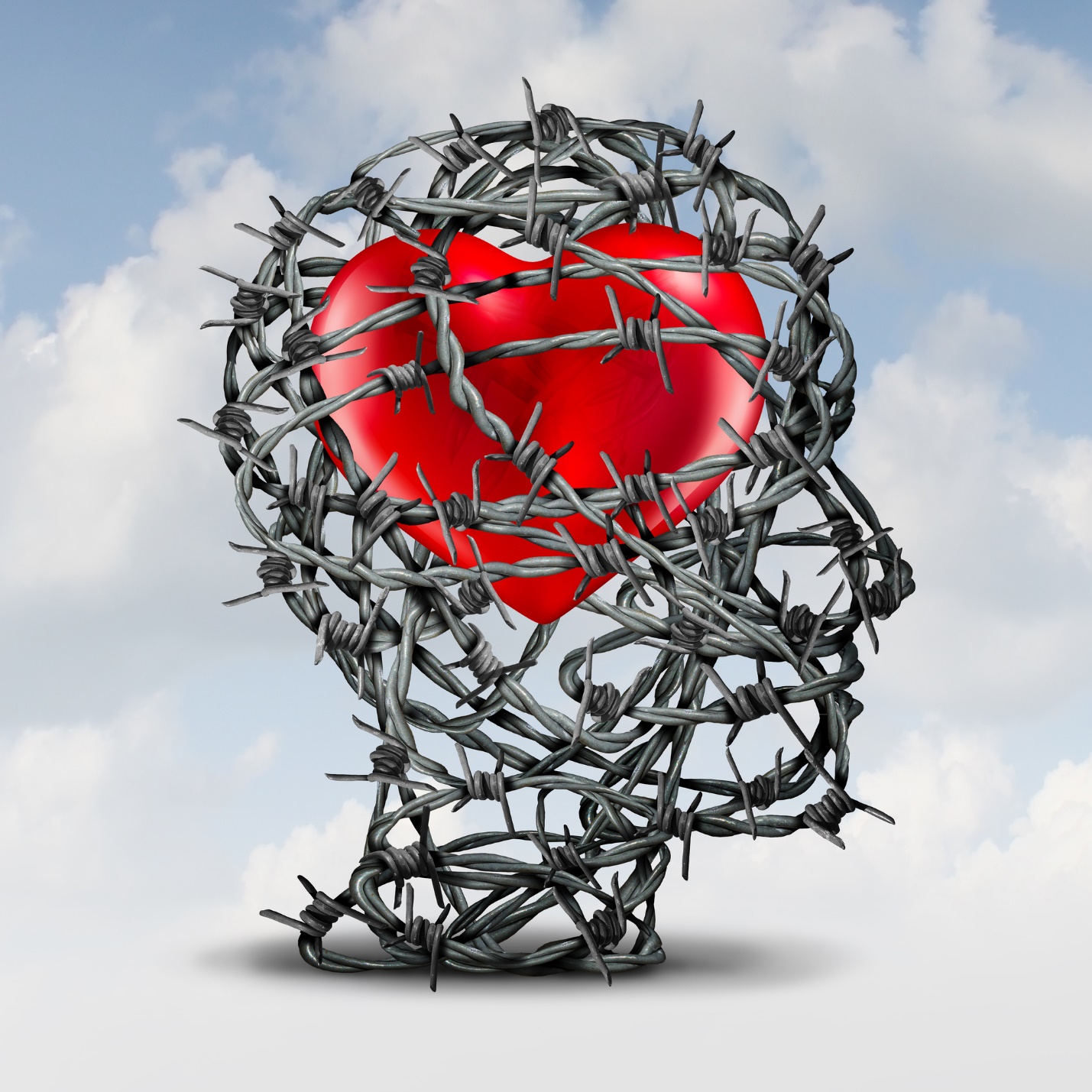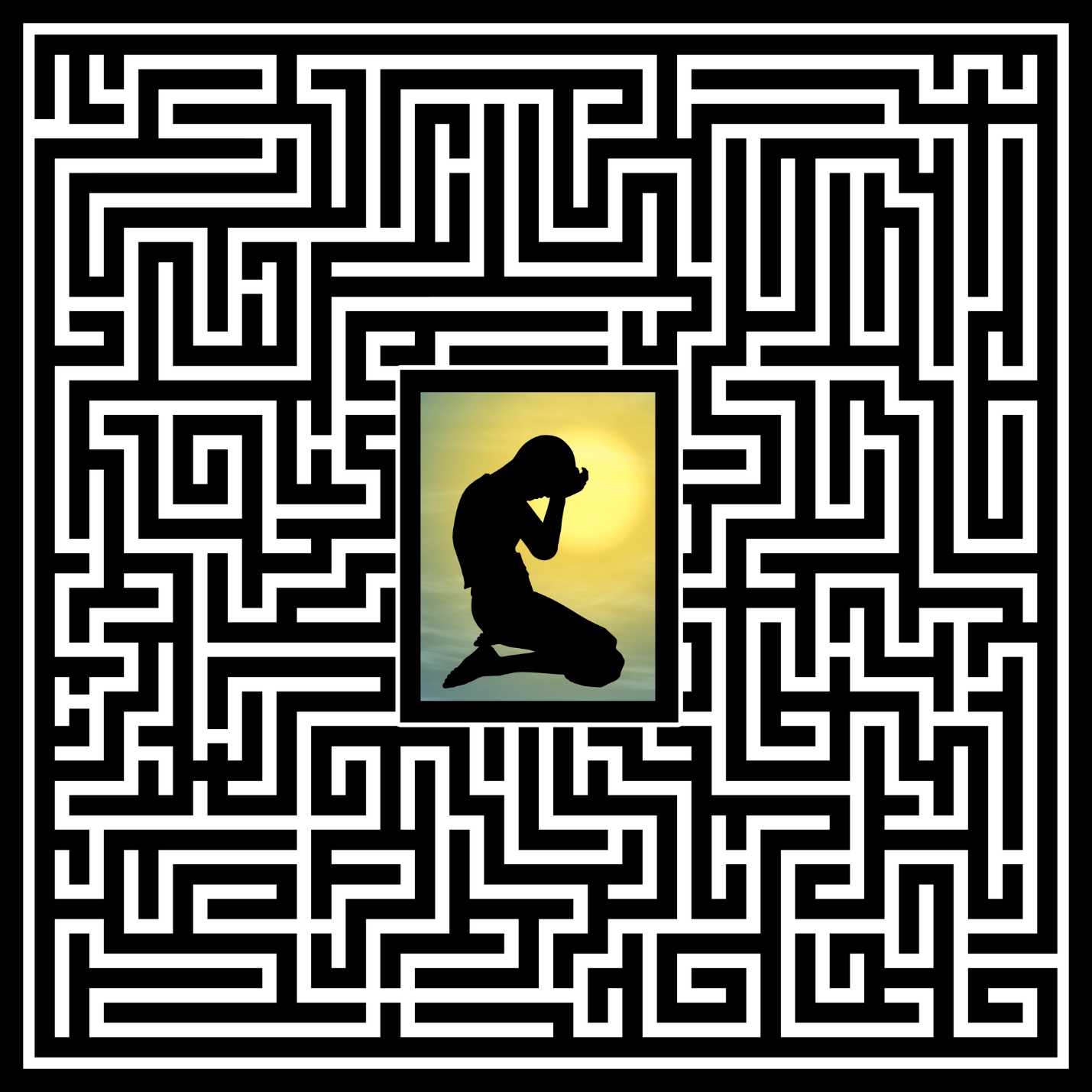BP117

Why People Divorce Their Hearts
Some people are afraid of their hearts.
They find it too frightening to be in touch with their interior world. Emotions are too strong. Too painful. Feelings will bring back memories they have worked so hard to forget. Yes, to feel is to remember and to remember is to feel. To feel is so physiologically arousing that their chests hurt, their throats tighten, and their stomachs ache.
Some people are alienated from their hearts.
They are cut off from large portions of their true selves. Detached. Being in touch with their hearts might lead them to their needs, and they don’t want to need. Needing is weak. Needing is dangerous because needs call them to trust others. They made a vow long ago not to need anything from anyone. It hurts too much to have expectations and not have them realized. So, in the end, it’s much safer to not need and never be disappointed than to share needs and experience rejection and abandonment.
Many people are not aware of it, but they avoid their hearts because being close to their hearts brings them too close to the existence and personhood of God. In fact, their hearts cry out for God.
These individuals want to avoid a rendezvous with the divine. They flee the Presence of God (and other people) as they flee from their own hearts. Sadly, they then suppress the truth that they are exceptional beings created by God for God. They settle for being mere animals in the same creature family as a beloved dog, cat, or horse. They prefer to be far from their hearts and settle for being an accident in the universe instead of being close to their hearts and experiencing the joy that comes with being exceptional beings designed by a personal God who expects something of them. Like a relationship.
Where You Turn if You Divorce Your Heart
To be afraid of your heart, to be alienated from it, to avoid it, one must then settle for something else besides emotional and relational intimacy.

One option is to stay in your brain. Be an intellect. Live in the library—the world of books. Lose yourself in the black and white dimension of knowledge like football statistics or health supplements or details about the lives of Hollywood personalities or even theology. Be an excellent communicator but never let anybody know you—not really. Maybe even view yourself much more as a brain than a mind. Focus on neuroscience to the exclusion of your heart needs, your soul hunger, and your spiritual identity. (Studying the brain might obviously be a good thing but be aware if it takes you away from an awareness of your soul. Know the nuances of life: something good can also be detrimental.)
And then you wonder why you are depressed and anxious.
Another option is to focus outwardly and take care of others and their needs while avoiding your own emotions and needs. A person can spend a lifetime distracting themselves from their own inner self by serving others, listening to their stories, comforting their emotions, taking care of their needs. Do both. Love your neighbor as yourself.
Humor, potentially, is another way to deflect from your inner self. So is playing lots of games—either video games or Settlers (Settlers of Catan for the uninitiated, the non-homeschooled, or those who did not attend private Christian schools like Wheaton, Westmont, Northwestern, or Bethel). I am mostly kidding about that last comment. Other types of people play Settlers as well. And please hear the nuance here again: I’m not saying that game playing is bad . . . unless it serves the purpose of taking you away from your heart and intimacy.
A story in USA Today focuses on the game, Dungeons and Dragons. The article says that “D&D’s universe is vast, with pantheons of gods, devils and demons, established villains and heroes.” The principal story designer at D&D, Chris Perkins, says that D&D enables individuals to tap into the “human need to escape the confines of our reality and experience other worlds in a safe, controlled space.” He also says that “the game allows us to be ourselves and someone else at the same time . . . to craft our own fictional characters, worlds, and adventures, and that’s very appealing when the real world is quickly burning to a cinder.”
I’m not here to beat on D&D. I’m just here to ask a few questions. Can D&D be a healthy avenue for some people to come out of their reserved selves and open up with others? Maybe. Can it even be healing for some who have experienced abuse and trauma? Possibly. Can it also be a way to escape from your emotions (or act them out in another personality that isn’t you) and avoid interactions in the real world? Yes.
The point is to look at your motivation for playing D&D and how it impacts you. If playing D&D takes you away from your own heart and diverts your emotional energy from being used in the world of real relationships, then there is a problem. You are creating another self that distances you from the real you.
 Yet another way to avoid the heart with all its emotions, needs, and hunger for Presence is to engage in activities that arouse emotions of fear and excitement in non-relational ways. One example is extreme sports.
Yet another way to avoid the heart with all its emotions, needs, and hunger for Presence is to engage in activities that arouse emotions of fear and excitement in non-relational ways. One example is extreme sports.
Bungee jumping, downhill skiing in an avalanche area, base-jumping (“illegal aerial delivery” as the park rangers call it) off cliffs in national parks, launching yourself four stories into the air from a superpipe, or free soloing El Capitan (!!) will arouse your body and your emotions but might never lead to any personal, relational growth. Sometimes, these activities might be a replacement for interpersonal intimacy, or they might be a way to avoid looking inside.
One other way to distance from our insides is to focus on the outside of ourselves. We can make ourselves beautiful, handsome, and physically fit on the outside at the expense of the inside or to intentionally avoid the true self. I believe that it is a wonderful thing to take care of your body with regular exercise. Personally, I’ve been doing aerobic exercise 3-4 times a week for forty years. However, dressing our bodies, cosmeticizing them, maintaining them sleek and buff can be a way to avoid the heart and life-giving relationships.
Please hear me again. I’m not saying that all video gaming, board gaming, humor, extreme sports, physical exercise, or extreme intellectual pursuits are motivated by a desire to avoid one’s heart. But if you are deep into any of these activities and experience chronic depression or anxiety, it is time to look inside and hear what your heart and soul are saying.
As seems true quite often, one must look beyond merely what we do to why we do it. If we are focusing on all the aforementioned activities as a way to distract from deep pain, scary unmet needs that only get stronger as we dungeon them, and because we want to avoid the Presence of God and others, then we need to stop and recalculate our route in life because if we hide ourselves long enough, it becomes a life-long habit that may kill our hearts and our ability to give and receive love.
There are hundreds of ways to avoid “withness”, love, and soul relationships that have nothing to do with the readily identifiable culprits of sex (including pornography), drugs, and alcohol.
The more time you spend disconnected from your true self, avoiding your emotions, memories, and poor coping skills that God wants you to address, the greater your anxiety and depression will be. Why? God made you for intimacy with Himself, others, and your own heart. He created you for love. When you cope with life by moving away from intimacy (vulnerability, transparency, and neediness), by default you choose aloneness. Aloneness always fosters anxiety.
Some Ingredients of Heart Divorce
We don’t always have to have a history of abuse or abandonment to hide our hearts. For one thing, we are born strangers to God, others, and our own hearts. It is our “unnatural natural” habit after the Fall to hide. Not knowing ourselves and others is our baseline position. We must generate tremendous effort to move toward God, self, and others. If we’re not moving toward, we’re moving away from.
In addition to our natural alienated position, you can factor in the lies of Satan or possibly the unspoken rules of your family of origin or even your own privately devised perceptions about yourself and the world.
These three sources of untruth can lead to avoiding transparency due to deeply engrained beliefs like, “I am too needy, so I have to hide my needs,” or “My true self gets hurt too easily and/or deeply so I cannot let anyone get too close to my heart,” or “I must not be selfish and focus on me but be there for others,” or, finally, “Nobody will ever understand me at the level I need to be understood—I will always be alone in my deepest heart. So why even try?”

So, what are we to do if our natural response is to fear the emotions in our hearts, to alienate ourselves from our needs, to avoid the Presence of God and others?
Jesus Calls You to Open Your Heart
I believe the road to exposing and knowing your heart begins with the love and safety found in the Presence of Jesus. Oswald Chambers said, “The dearest friend on earth is a mere shadow compared to Jesus Christ.” George Muller said, “Oh, this is a reality, not a fable, that the Lord Jesus Christ is our friend. And we should not be satisfied till we are brought to this.”
Jesus Himself said, “This is my commandment, that you love one another as I have loved you. Greater love has no one than this, that someone lay down his life for his friends. You are my friends if you do what I command you. No longer do I call you servants, for the servant does not know what his master is doing; but I have called you friends, for all that I have heard from my Father I have made known to you ~ John 15:12-15
Did you catch what Jesus said to us? Yes, He said that we are His friends, that He has confided the things of the Father to us, and that He has died for us. How could we not want to love Him? But He also says to “love one another as I have loved you.”
Jesus calls us to love Him but also to love those who wear skin around us. We are to draw close enough to people to love them—to hear them, know them, comfort them. As with our relationship with Jesus, our intimacy with others is meant to be mutual. We love others and we allow them to love us.
So, the message of this post is to ask the Holy Spirit to reveal to you if you are avoiding your heart with its emotions, needs, and hard-wired hunger to move toward God and others. Identify and remove every obstacle that rises up between you and friendship with God and others. I can guarantee you that obstacles are present.
The question is, will you recognize the terrible battle for your soul? The enemy wants you to divorce your heart and its God-created capacity to know others and love others–or at least to not grow that capacity. He slaves day and night to narrow your affections for Jesus and others.
Your best friend, Creator, and Savior lives to make you increasingly like Him. Such a miraculous transformation requires you to open your heart, soul, and mind to Him. He will then fill you with His love.
Closed hearts are not capable of love.

Rather train yourself for godliness; for while bodily training is of some value, godliness is of value in every way, as it holds promise for the present life and also for the life to come ~ 1 Timothy 4:7-8
We have spoken freely to you, Corinthians; our heart is wide open. You are not restricted by us, but you are restricted in your own affections. In return (I speak as to children) widen your hearts also ~ 2 Corinthians 6:11ff
A new commandment I give to you, that you love one another: just as I have loved you, you also are to love one another. By this all people will know that you are my disciples, if you have love for one another ~ John 13:34-35
